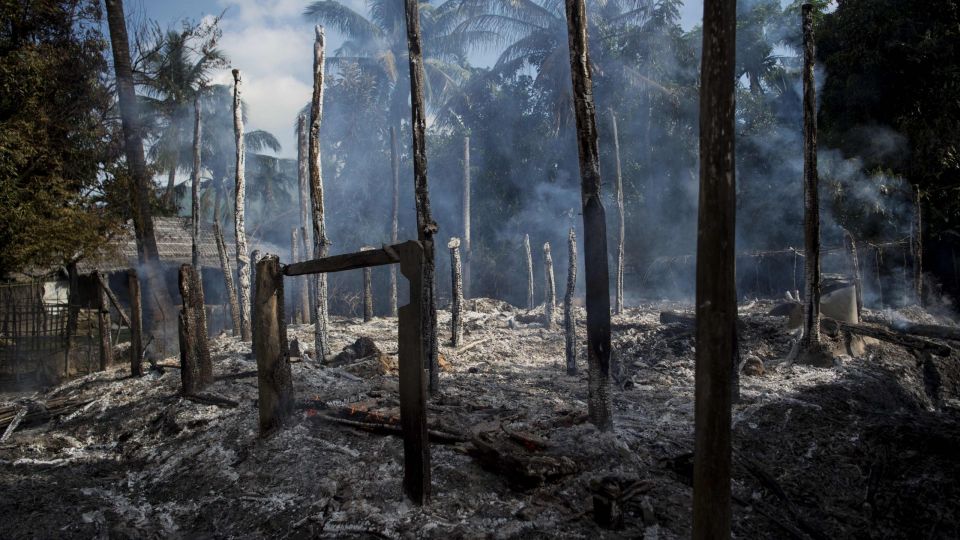August 29, 2018
Protests, findings and social media bans have increased pressure on Aung San Suu Kyi’s government one year after a deadly crackdown on Rohingya refugees.
A little over a year ago, Myanmar’s military launched an operation against Rohingya refugees in Rakhine state in response to sporadic attacks on its personnel by local militant groups.
The operations resulted in mass arson, rapes and killings and sparking a mass exodus of refugees across the border to Bangladesh.
The UN mission in a report published on Monday said Myanmar’s top military generals, including Commander-in-Chief Senior-General Min Aung Hlaing, must be prosecuted for genocide, crimes against humanity and war crimes over their actions against the minority group, according to the Daily Star.
The UN mission, however, found that the Myanmar armed forces had taken actions that “undoubtedly amount to the gravest crimes under the international law” and “grossly disproportionate to actual security threat”.
The three-member UN mission found that the Myanmar military carried out mass killing and gang rapes of Rohingyas with “genocidal intent” while the civilian government led by Aung San Suu Kyi allowed hate speech to thrive, destroyed documents and failed to protect minorities from crimes.
In its recommendations, the panel said the UN Security Council should set up an ad hoc tribunal to try suspects or refer them to the International Criminal Court in The Hague.
The Security Council also should impose an arms embargo on Myanmar and adopt targeted individual sanctions, including travel bans and asset freezes, against those who appear most responsible for serious crimes under international law.
The mission suggested that the international community, through the UN, should use all diplomatic, humanitarian and other peaceful means to assist Myanmar in meeting its responsibility to protect its people from genocide, crimes against humanity and war crimes.
Myanmar have denied these accusations and the result of the special investigation.
Myanmar’s permanent representative to the UN, U Hau Do Suan, told the BBC: “As we did not accept the idea of a fact-finding mission from the beginning, we reject their report.
“The human rights abuses are one-sided accusations against us. This is designed at putting pressure on us by the international organisations.
According to another government spokesman.
“We have already dissociated ourselves from the resolution of the UN Human Rights Council, meaning Myanmar does not accept the establishment of that mission. So we do not accept any finding of that mission, and there is no way to cooperate with the Fact Finding Mission. We do not accept the one-sided accusations by that mission,” said presidential spokesperson Zaw Htay to the Nation Newspaper.
“Actually, it is like an intentional attack on our country. For one thing, August 27 is not the date set for the launch of UN Fact-Finding Mission’s report, which was supposed to be submitted on September 18. But as the UN Security Council currently is holding a meeting on Myanmar affairs , we believe the report was timed as a blow to us just before the meeting,” Zaw Htay said.
In a speech in Singapore, Myanmar’s de-facto leader Aung San Suu Kyi echoed those sentiments, according to Eleven Media.
“The word “stigma” is not appropriate word in using here because there are one-sided views and misunderstanding. These must be removed,” Suu Kyi said. “Is there a timetable to settle all forms of problems as to the re-acceptance of displaced persons to Rakhine State?” It is not easy to draw a timetable for our side. This is because we are working together with Bangladesh. Our two countries will have to fix the timetable”
The repatriation of the Rohingyas remains elusive even nine months after the signing of an agreement between Bangladesh and Myanmar. The deal inked between Dhaka and Naypyidaw in November announced that their return must begin in January 2018, within two months of the agreement signing. However, the repatriation of the refugees is precipitated upon a voluntary return basis, something refugees are hesitant to do given the conditions that necessitated their exodus.
One Year Later
During the one-year anniversary of the crackdown earlier this month, the Rohingya staged massive protests over an apparent lack of justice.
“We are Rohingya, we want justice,” people chanted in the Kutupalong camp.
According to AFP, in a different part of the camp, thousands of women and children marched behind a huge poster declaring: “365 days of crying. Now I am angry.”
Suu Kyi is also facing increasing pressure from international voices.
More than 130 Members of Parliament from Asean nations, including two from Singapore, have demanded that Myanmar be investigated by the International Criminal Court (ICC), the most united condemnation from the region since the violence began against the Rohingya a year ago, according to the Straits Times.
In a joint statement released by Asean Parliamentarians for Human Rights (APHR), the 132 sitting MPs from five countries called for the Myanmar military to be brought to justice for its “murderous operation in Rakhine State”.
The US State Department, which has yet to declare a “genocide” in Myanmar, said the UN report added to a “growing body of information indicating widespread human rights abuses by the Burmese military and other security forces”.
Michael McGrath, Save the Children country director in Myanmar, said the evidence presented by the fact-finding mission is clear. “Children and their families have been murdered, sexually assaulted and forced to flee burning villages, and they have not yet seen the justice they deserve.”


